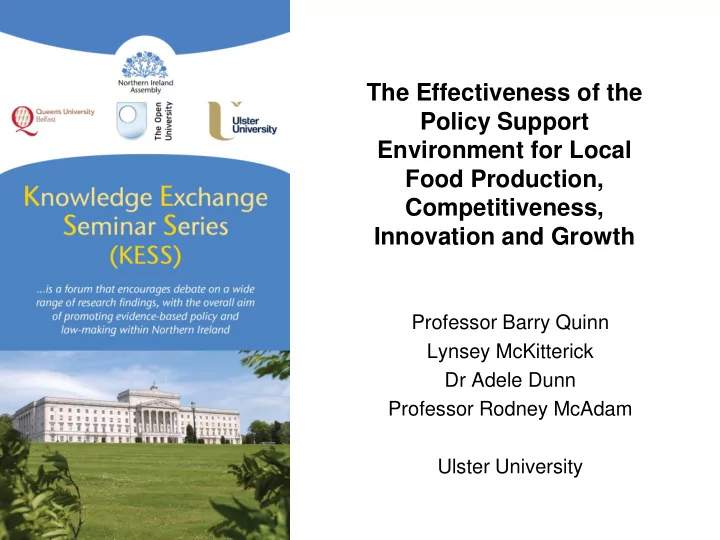

The Effectiveness of the Policy Support Environment for Local Food Production, Competitiveness, Innovation and Growth Professor Barry Quinn Lynsey McKitterick Dr Adele Dunn Professor Rodney McAdam Ulster University
Local Food as an Engine for Local Business http://www.locfood.no
LOCFOOD: Project Aims What? European Union (EU) funded INTERREG IVC LOCFOOD (Local Food as an Engine for Local Business) project (2012 – 2014) • to improve regional policies supporting food SMEs in rural areas • focus on artisans and micro-businesses (< 10 employees) Who? 13 partners in 9 European countries – local authorities and development agencies, including 2 partners in Northern Ireland How? Review of current policy / support to food sector: • Survey of producers – experience of support and levels of innovation • Consultations with stakeholders and producers
LOCFOOD NI Steering Group • Ulster University • Down District Council • DARD/Agri-Food Strategy Board Secretariat • DETI • Invest NI • NI Food and Drink Association • NI Tourist Board • Rural Network NI/Rural Development Council
NI Agri-Food Context • AFSB ‘Going for Growth’ Strategy • NITB Naturally NI Strategy • Rural Development Programme 2014 – 2020 • New Councils from 2015 – with enhanced LED responsibilities • NI European Entrepreneurial Region 2015 • 2016 Year of Food • SEED Food Programmes experience
Key Activities DARD, Invest NI etc • Mapping of policy and strategies • Surveys of small food LOCFOOD project total 457 producers NI total 39 • Study visits to partner regions 7 study visits organised • Identification of Good Practices 77 policy and company Good Practices identified
European Results • Relatively high levels of product innovation recorded in most partner regions (65% compared to 53% for EU Community Innovation Survey) • The majority of product/service innovations new to the business rather than the market • Process innovation (48% of respondents) • Owner-manager is main source of innovation – followed by customers and suppliers • Less reliance on support from external sources such as universities, consultants and government • Lack of networking/collaboration activity • Key barriers to innovation include cost and regulations
NI Results • In line with European results on innovation aspects • Micro food producers use a wide variety of sources for innovation • Engagement with introductory levels of Government support (e.g. Innovation Vouchers scheme) but not advanced forms of support • However, a number of key barriers to further adoption of support including: • understanding and coherency of support • regulations and level of bureaucracy • networking capabilities
NI Results (cont.) • Barriers to Networking • Trust and shared values • Loss of company secrets • Network sustainability • Costs of engagement
Policy/Programme ‘Gaps’ • Co-ordinated approach • Data on micro food producers and their activities • Complex funding/eligibility criteria and bureaucracy of funded programmes • Co-operation between food producers, and educational institutions • Sustainability of networks • Generic nature of support programmes
Identification of Good Practices • 77 good practice initiatives highlighted, at policy and company levels • Wide ranging objectives and involve multiple target groups and stakeholders • The value of a network and trade name, for the food business and the region • The sustainability of projects is a major theme - these initiatives need on-going administrative and funding support • Possible adoption of aspects of good practice in NI
Recommendations/Select Actions • Further programmes on SEED ‘Food to Follow’ model Business development • support Link InvestNI/DARD to companies for advanced programme support • Promote Innovation Vouchers • Collaboration Develop knowledge transfer between large/micro firms • Encourage collaboration through innovation vouchers • Explore collaborative solutions to exporting • Include provision for collaboration through Rural Development Programme Public procurement • Promote local food through events supply contracts • Break down large contracts enabling smaller producers/suppliers to compete • Review current schools support for local food sourcing
Recommendations/Select Actions (cont.) • Showcase local food at official events Local food experience • Support local and quality street food providers as part of local festivals • Create/support local food circle/food network • Establish/further develop quality food markets in local towns Food and Tourism • Specify provision of quality local food at conferences/tourism events Underpinning recommendation: • Minimum one annual food-focused festival in each • Assist Collaboration between micro-businesses, and with larger council area • companies, boosting Innovation and Growth Identify PDO/PGI status foods and support applications Food tourism trails •
Project Outputs to Date • Response to consultations (e.g. Agri-Food Strategy Board) • Report to ARD Committee (May 2014) • ‘Local Food: Making Small Producers Part of the Bigger Picture’ Conference (June 2014) • Input to DARD Rural Development Programme 2014 -2020 Food sector – relevant Measures • Draft Model Local Authority Local Food Policy
Further Information Contact: Professor Barry Quinn Ulster University email: b.quinn@ulster.ac.uk European partners’ Good Practice information on LOCFOOD website at: http://www.locfood.no
Recommend
More recommend